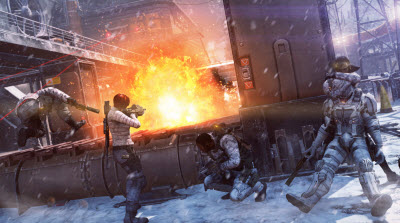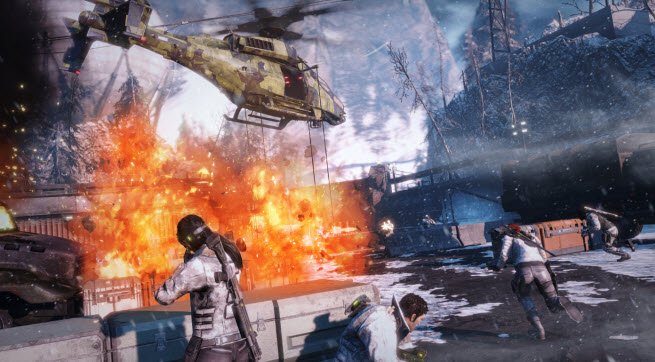Insomniac Games’ new cooperative-style sci-fi shooting game Fuse has already lit a few controversies. When Insomniac first revealed it at the E3 trade show in 2011, it was a comic title called Overstrike. But the development team did some soul-searching and decided to re-create Fuse’s tone as a serious game with intense, mature combat, akin to the fierce battles in Gears of War. The change raised hackles among fans, some of whom preferred the previous style, but it unleashes Insomniac’s developers to make the game that they want to build.
As currently conceived, Fuse is a four-player co-op game with a single-player campaign and a multiplayer version dubbed Fuse Echelon. You have to work together to take down enemies, upgrade weapons, and unlock abilities. The Overstrike 9 agents, as the characters are called, have access to upgradeable weapons powered by an alien energy dubbed Fuse, which can help them create monumental damage. I caught up with Ted Price, chief executive of Insomniac, which has a built a strong reputation on the Ratchet & Clank and Resistance franchises.
Electronic Arts is publishing the game next March, as long as Insomniac — with its 220 employees — doesn’t get the urge to tear its designs up and start over again. And this one is going to be available on multiple platforms, including the Xbox 360 and the PlayStation 3. That’s the first time years that Insomniac has moved beyond the Sony PlayStation platform to something else. I played the Echelon multiplayer version of Fuse before I interviewed Price. Here’s an edited transcript of our talk.
Ted Price: So what did you think?
GamesBeat: It’s different. It’s not something I’ve seen before. With the emphasis on four players, it seems like Left 4 Dead in some ways. But in a very different environment and setting.
Price: Yeah. One thing we were adamant about at the very beginning is making sure that it’s a great single-player experience. In fact, we weren’t showing it tonight, but you can play Echelon by yourself. You always play with four characters, so three of the characters will be bots. Same thing with the campaign. Personally, I play through the campaign in single-player all the time. I’m probably less social than some of my peers, but I also want to see how things are shaping up.
We spent a lot of time with the bots. We have a very specific philosophy when it comes to the bots. It’s been important for us to make that work. The bots have to do what you want them to do, what you expect them to do, but they can’t go crazy and steal your kills and be the kind of bots that you shake your fist and say, “I can’t believe you just ruined my moment of victory!” That’s been a constant tuning challenge for us over the last several years.
 GamesBeat: Backing up a little, tell me about the emergence of this project and where you guys left off. You’d just finished a series; were trying to come up with something new?
GamesBeat: Backing up a little, tell me about the emergence of this project and where you guys left off. You’d just finished a series; were trying to come up with something new?
Price: Well, Brian Allgeier is our creative director on Fuse. He proposed a four-player cooperative game featuring agents who infiltrate exotic locations across the globe. That was a few years ago. We latched on to that because we wanted to create a game that reflected how social gaming has become. Something that reflected the fact that gamers want to play with their friends. Consoles in particular make it very easy to get online and play with your buddies.
At the same time, we were wary of making a four-player co-op game, for two reasons. One, design metrics are tough when you have four characters in your game at all times. You have to be really careful about how you design your spaces. Second, we wanted to make sure that we weren’t ignoring the fact that a lot of players are going to want to play this game by themselves. From the very beginning, we wanted to balance those two experiences well. We’ve been spending the last few years doing that. That was the genesis, and that hasn’t changed at all — the desire to make a great four-player cooperative game and a great single-player game that runs through the same campaign and the same universe.
GamesBeat: It’s also coming at the end of a long cycle here, where people have had three games worth of Resistance, Halo, and Gears of War. It seems like you had to do something different from those as well.
Price: The pressure was even higher to do something that stood out. We’re going up against games that have mature engines, mature stories — meaning stories that have been around for a while and developed their characters — and mature gameplay philosophies. We’re coming in as the new kid on the block. We understand that we’re probably going to be judged more harshly as a result.
GamesBeat: And an original intellectual property on multiple platforms seems like a new thing for you too. Why did you go that way?
 Price: We own the IP to Fuse. That’s been important for us, because we want to be able to control where this world is going. In the long term, that’s a goal of ours as a company. As for multiplatform, going in that direction has been a desire of ours for a while. We want to reach a broader audience. We want to reach out to Xbox 360 players who asked us, over and over again, “When are you going to make a game for us?” Early on, we made the call to create new IP that is multiplatform, and build new technology and tools that support both Xbox 360 and PlayStation 3.
Price: We own the IP to Fuse. That’s been important for us, because we want to be able to control where this world is going. In the long term, that’s a goal of ours as a company. As for multiplatform, going in that direction has been a desire of ours for a while. We want to reach a broader audience. We want to reach out to Xbox 360 players who asked us, over and over again, “When are you going to make a game for us?” Early on, we made the call to create new IP that is multiplatform, and build new technology and tools that support both Xbox 360 and PlayStation 3.
Getting back to the new IP, the new universe idea, as a company we really enjoy making new universes. It’s exciting and terrifying. Exciting because you can do anything, and terrifying because you never know how it’s going to be received.
Every single universe that we’ve created has evolved significantly during production. In this case — I’ll just attack this head-on — in 2011 we released a trailer for the game made by Blur. It was great, a really good trailer. That showed the promise of the game and the style that we were heading for. Like all of our games, we continued to change the style. When we revealed the changes a year later, we got a shocked reaction from a lot of fans who had built up the game in their heads from this trailer they saw in 2011.
Now, ironically, Fuse has changed less than any other IP that we’ve built. But this has been a much more public change. I know a lot of people have had fairly strong reactions. It’s interesting, too — since we released a trailer two months ago, we’ve made major changes to the look of the game. We’ve added a lot more color. That’s been in response to fan feedback from this first new trailer that we released. I think when people see it again, they’re going to be surprised at how much it’s morphed one more time. But that’s the development process. That’s what we enjoy. That’s how we get to a final product that we’re truly proud of.
 GamesBeat: Would you call this pivoting, or do you actually sort of pivot on a daily basis?
GamesBeat: Would you call this pivoting, or do you actually sort of pivot on a daily basis?
Price: I wouldn’t say we do it on a daily basis. The decisions we make, we analyze them, we think them through, we prototype, and eventually we land on something. That happens on a gradual basis. Usually, depending on what area it is, we’ll lock something down and say, “This is not changing.” There are points in the development process where you have to do that, whether it’s tech or character design or genre. You name it. But there are other things we continue to evolve throughout.
The balance we have to strike is creating a schizophrenic personality for players. We need to create the identity that people can latch onto and get excited about. Since we’re launching in the spring of 2013, we’re at the point now where we’ve locked down who we are and what this game is. Tonight was a great chance for us to show off wha we believe is the game’s identity.
GamesBeat: Given the state of the industry right now, it does seem like a good time to go multiplatform. You almost need that room to spread out. You were on that panel at the DICE Summit last year about companies that have been around for more than two decades. That’s a long time to stay on one platform.
Price: No, I agree. And it’s not just consoles. To be fair, we haven’t been around for two decades. Not quite two decades. We’re coming up on our 19th birthday at Insomniac.
GamesBeat: Do you look at the industry with dismay right now?
Price: Not at all. The industry reflects society right now. Society is evolving extremely fast in terms of how it uses technology. Our industry is experiencing that change as well. We’ve been very lucky over the last almost two decades to have a stable, predictable industry. But now we’re in a different world. That change has come upon us and everyone else in the world in the last five years. So it’s not just us. It’s the internet. It’s sales. It’s traditional media. Everything and everybody is feeling the effects of this accelerated change in our world.

